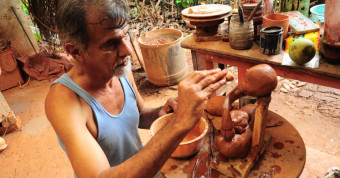Who will it be?
What’s a Goan to do if she’s happy with the BJP’s performance here at home but can’t stand the prospect of Narendra Modi as prime minister? Or if he’s very keen on a local Congress candidate but thinks the BJP is India’s best hope nationally?
We won’t know the election results until May 16, cost but from the look of things, buy Congress in Goa, as in the rest of India, has a lot more to worry about than does the BJP. Despite all the local electoral intrigue (and there was a lot of it), in the end Goans understood their vote for our state’s two Lok Sabha representatives was more of a national referendum than a local choice.
That’s why the BJP – in Goa and throughout India – has good reason to be optimistic, given the millions of indications that things are going their way.
“Talk within the Congress office is that cracks are already beginning to emerge with the Congress camp in anticipation of defeat. The party president and the North Goa candidate have begun to blame each other,” said Prakash Sakhalkar, who runs a business right outside the Congress office.
I did a small, unscientific poll the other day, asking average folks I met on the street if they’d ever heard of 2002 riots in Gujarat, for which Modi has come under so much criticism. I was surprised at the number of people who simply had never heard about the deadly events, or the allegations against Modi that he was, at the least, complicit in them. It struck me that Congress’ best hope for salvaging these elections – shouting out loud and clear the reservations about Modi – had been royally squandered.
All that said, Congress does stand a very real chance of winning at least one of the state’s Lok Sabha seats, with a good number of voters not too thrilled about the performance of the current BJP government in Goa and with a strong candidate in South Goa named Aleixo Reginaldo Lourenco.
There’s been an almost eerie silence about Goans’ political choices both during and after these elections. A silent vote is one which ideally can go anywhere, but it’s often one that goes against the ruling dispensation. Is it a guilty silence, where the people abandoned the BJP but do not want to be vocal about it for fear of a backlash or because they are guilty about accepting money in the past? Or are they silent because they’re being cautious about celebrating too early? Or have they simply grown wiser and keeping their cards close to their chest?
With neither of the two main parties exuding confidence, several theories are doing the rounds. The two most popular ones are that BJP will wrest both seats aided by divided opponents or that the Congress will retain the South Goa seat, while the BJP retains the North.
Common to both the theories is that the BJP will retain the Hindu-dominated North seat for a fourth successive election, riding on the back of an uninspiring Congress candidate.
It’s telling that Chief Minister Manohar Parrikar spent most of his time campaigning in South Goa, especially Salcete. The party has consciously kept Modi out of the discourse and instead chose to focus on the development Parrikar can offer.
Despite the vote’s national overtones, the BJP views the election as a referendum on Parrikar’s two-year-old government. Foremost among the BJP’s tricks is uniting all the non-Congress MLAs and portraying their leaders as being with the BJP. However, many Salcete voters are skeptical about that strategy.
“When the local MLA says to vote for one party and the local parish priest says to specifically vote for any party but that, who do you think the people will listen to?” said Savio Rebello a resident of Navelim that is the hotbed of a war between the BJP, the Congress and the former legislator of the area, Churchill Alemão. (Answer to the question: The priest.)
“While it’s difficult to say what the mood is, it is almost certain that the national elections are a different ball game than the local ones. People who have voted for a non-Congress MLA in the state elections will turn back and vote for the Congress this time,” Rebello added.
What will work in the BJP’s favour in the south is that the predominantly Hindu areas of Marcaim, Siroda, Ponda and Sanvordem seem sure to vote predominantly for the party, on account of the shrill polarization of the debate in South Goa.
“Calling out to Catholics to vote for a secular candidate works both ways. It also drives Hindus to vote for the BJP. Such a strategy of the Congress could backfire,” said Deepak Bhandigare, a local journalist.
If the BJP wins both seats, it’s likely give the government an aura of invincibility. That could help the government go full steam ahead with the controversial proposed Mopa Airport in the North as well as other projects. (The Mopa airport was a major election issue in the South, where many are opposed). On the other hand, losing one or both Lok Sabha seats will surely dent the Parrikar government’s confidence and ability to push its agenda.
An interesting question is what will be the fate of the Aam Aadmi Party (AAP). From the look of it, the party’s candidate in the North will do much better than the one in the South, with the latter — Swati Kerkar– even expected to lose the deposit she paid to register as a candidate (it’s forfeited if you don’t get enough votes).
In the North, however, backed by a past political life as well as some well known activism, Dr. Dattaram Desai can also bank on an uninspiring Congress campaign.
It’s clear that a good number of persons disgruntled with the both BJP and the Congress voted for the AAP.
However, in the South Swati Kerkar’s failure to make inroads has a lot to do with Congress fielding Reginaldo, who is seen as young, energetic and clean.
Here’s how one local newspaper editor put it: “It wasn’t as if the Congress was asking the electorate to vote for a corrupt candidate in the name of secularism.”
But has the Goan voter really changed? AAP member and sympathiser Samir Kelekar spoke of two voters, a Catholic from Davorlim who voted for Congress just because that’s what his whole neighbourhood did, and another in Margao who said he voted for BJP “because Modi represents his religion.”
“The above are two typical examples of how masses vote. It is going to take a herculean task to convince them of a party like AAP,” Kelekar surmised.




